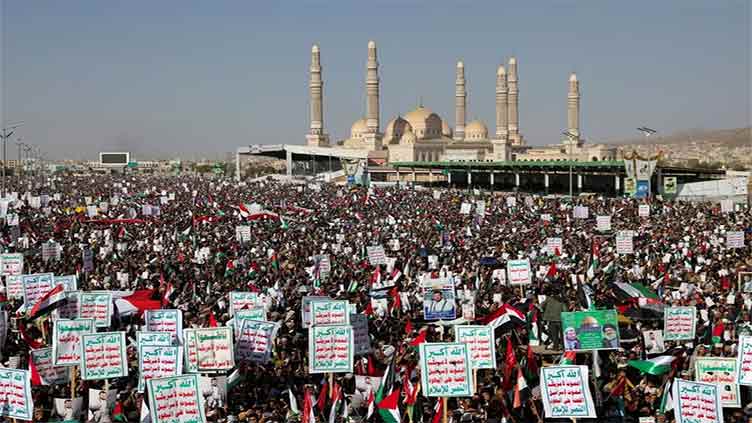Exclusive: Iranian and Hezbollah commanders help direct Houthi attacks in Yemen, sources say

World
Exclusive: Iranian and Hezbollah commanders help direct Houthi attacks in Yemen, sources say
DUBAI (Reuters) - Commanders from Iran's Islamic Revolutionary Guards Corps (IRGC) and Lebanon's Hezbollah group are on the ground in Yemen helping to direct and oversee Houthi attacks on Red Sea shipping, four regional and two Iranian sources told Reuters.
Iran - which has armed, trained and funded the Houthis - stepped up its weapons supplies to the militia in the wake of the war in Gaza, which erupted after Iranian-backed militants Hamas attacked Israel on Oct. 7, the four regional sources said.
Tehran has provided advanced drones, anti-ship cruise missiles, precision-strike ballistic missiles and medium-range missiles to the Houthis, who started targeting commercial vessels in November in solidarity with Palestinians in Gaza, the sources said.
IRGC commanders and advisers are also providing know-how, data and intelligence support to determine which of the dozens of vessels travelling through the Red Sea each day are destined for Israel and constitute Houthi targets, all the sources said.
Washington said last month that Iran was deeply involved in planning operations against shipping in the Red Sea and that its intelligence was critical to enable the Houthis to target ships.
In response to a request for comment for this story, the White House pointed to its previous public comments about how Iran has been supporting the Houthis.
In his weekly news conferences, Iran's Foreign Ministry spokesman Nasser Kanaani has repeatedly denied Tehran is involved in the Red Sea attacks by the Houthis. The IRGC public relations office did not respond to request for comment.
Advertisement · Scroll to continue
Houthi spokesperson Mohammed Abdulsalam denied any Iranian or Hezbollah involvement in helping to direct the Red Sea attacks. A Hezbollah spokesperson did not respond to a request for comment.
The Houthis, who emerged in the 1980s as an armed group in opposition to Saudi Arabia's Sunni religious influence in Yemen, say they are supporting Hamas by striking commercial ships they say are either linked to Israel or are heading to Israeli ports.
Their attacks have affected global shipping between Asia and Europe through the Bab al-Mandab strait off Yemen. That has triggered U.S. and British air strikes on Houthi targets in the country, opening a new theatre of conflict linked to the war in Gaza.
The Gaza conflict has also sparked clashes between Israel and Hezbollah militants along the Lebanese border, as well as attacks by Iran-linked groups on U.S. targets in Iraq and Syria.
"The Revolutionary Guards have been helping the Houthis with military training (on advanced weapons)," an Iranian insider told Reuters. "A group of Houthi fighters were in Iran last month and were trained in an IRGC base in central Iran to get familiar with the new technology and the use of missiles."
The person said Iranian commanders had travelled to Yemen as well and set up a command centre in the capital Sanaa for the Red Sea attacks which is being run by the senior IRGC commander responsible for Yemen.
REGIONAL STRATEGY
The Red Sea attacks fit in with Iran's strategy of expanding and mobilising its regional Shi'ite network of armed militias to project its influence and show its ability to threaten maritime security in the region and beyond, two analysts said.
They said Tehran wanted to show that the Gaza war could be too costly for the West if it drags on - and could have catastrophic consequences in the region as things escalate.
"The Houthis are not acting independently," said Abdulaziz al-Sager, director of the Gulf Research Center think-tank, who based his conclusion on a close analysis of the capabilities of the group, which has an estimated 20,000 fighters.


